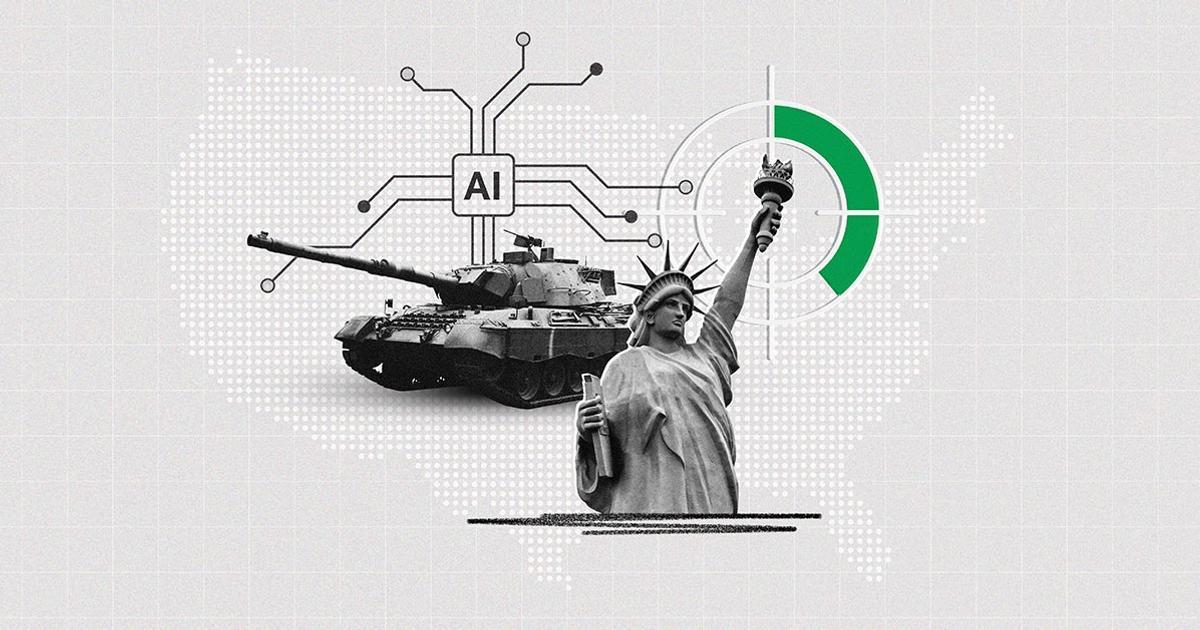Global Concerns Outweigh Excitement as AI Adoption Grows
4 Sources
4 Sources
[1]
Feeling Uneasy About AI? Here's How People View It Across 25 Countries
Emily is an experienced reporter who covers cutting-edge tech, from AI and EVs to brain implants. She stays grounded by hiking and playing guitar. Don't miss out on our latest stories. Add PCMag as a preferred source on Google. People around the world are feeling more concerned than excited about AI's growing presence in everyday life, and only a small fraction are all in. The US and Italy have the most concerned citizens, with 50% feeling more concerned than excited, according to a Pew Research survey conducted in spring 2025 and published today. Most Americans (38%) are equally concerned and excited, while just 10% feel mostly excited. The only country to have fewer citizens more excited than concerned than the US is Canada, at 9%. The most excited country is Israel (29%), followed by South Korea and Sweden (22%), and Nigeria (20%). That's a pretty slim showing for the excited crowd. Clearly, the majority across all countries feels some significant amount of apprehension. The study did not list those concerns, but they may include misinformation, biases, data privacy, deepfakes and misleading content, copyright protections, cybersecurity, environmental destruction, and more. At the same time, ChatGPT usage continues to grow, with 800 million people talking to the chatbot every week, OpenAI says. It's one of the top five most-visited websites in the world. Survey respondents also expressed a lack of faith in the US and China's ability to regulate AI effectively. Most people either trust their own country or the EU to do it right, likely given its proactiveness with legislation like the EU AI Act. The EU also has a history of curbing the tech industry's power, such as when it got Apple to abandon its proprietary charging cord and adopt the more consumer-friendly USB-C. Indians had the most trust in their country's ability to regulate AI (89%), followed by Indonesians (74%), and Israelis (72%). On the other end of the spectrum, Greeks had the least trust (22%). "Generally, people who are more enthusiastic about AI are more likely to trust their country to regulate the technology," says Pew Research. "And in many countries, views on this question are related to party affiliation or support for the governing coalition." Americans were almost evenly split between trust (44%) and distrust (47%). However, the majority of Republicans and right-leaning independents had a higher confidence in the US's ability to appropriately regulate AI (54%), compared with Democrats and Democratic Party leaners (36%). Pew also measured how familiar respondents are with AI, finding that young adults are the most aware in "virtually every country" than older generations. But Gen Zers also have significant concerns about the fate of their generation, with 40% saying they are "living through the worst period in human history." They also feel their peers are relying too heavily on AI, according to a study by EduBirdie. Across the board, nations with higher income are more familiar with AI than those in less wealthy economies. For example, half of adults in Japan, Germany, France, and the US say they "have heard a lot about AI," compared with just 14% in India and 12% in Kenya. There's also a gender split. In more than half the countries, men were more likely to have "heard a lot about AI" than women. Women are also more likely to be "mostly concerned" about the increasing use of AI. However, OpenAI released a study in September that found more than half of ChatGPT users are women. People who are chronically online -- "use the internet almost constantly," as Pew puts it -- are also more likely than the less Internet-obsessed to be excited about the growing use of AI in everyday life.
[2]
The US is the country most worried about AI, Pew survey finds
Serving tech enthusiasts for over 25 years. TechSpot means tech analysis and advice you can trust. A hot potato: The companies creating and investing in generative AI push the narrative that the technology will be more revolutionary than the internet. Most of the world, however, has a very different view, with the majority of countries more concerned than they are excited. The nation with the most worried population is the US, which started and is driving the industry. A recent survey from the Pew Research Center looks at how people around the world view AI. The bottom line is that a median of 43% of respondents said they are equally concerned and excited. That's only 8% more than the 34% who said they were more concerned than excited. As for those who agree with the AI firms and feel more excited than concerned, a mere 16% of people fall into this category. Levels of concern vary by country. The US and Italy appear most worried, with half of respondents from these nations saying they are more concerned - just 10% of those in the US feel the opposite. The only country with fewer people excited about AI than the US is Canada (9%). Only two countries have more people excited about AI than concerned: Israel (21% vs. 29%), and South Korea (16% vs. 22%). In no country do more than three in ten adults say they are excited. The survey shows a correlation between a country's income and awareness of AI; those in higher-income nations tend to have heard more about the technology. There's also a link showing that people with less education are more concerned about AI than those with more education. People who use the internet almost constantly are more likely to be excited at the prospect of AI entering every aspect of our lives, too. Most people trust their own governments to regulate AI, including 89% of adults in India, 74% in Indonesia, and 72% in Israel. In the US, where this has become a hot-button topic, 44% of people trust the government to regulate AI and 47% are distrustful. Unsurprisingly, countries that are more enthusiastic about AI have more trust that their government will regulate the industry. In the US, 54% of Republican Party supporters trust the government to regulate AI effectively. Just 36% of Democrats feel the same. Many CEOs and AI executives, including OpenAI boss Sam Altman, now admit that it will kill off jobs and erase entire work categories, a contrast to the previous claim that it would augment people's work. Despite these admissions, many within the industry still seem confused or even annoyed that the public doesn't share their enthusiasm for AI. The survey results further illustrate most of the public's apathy or anger toward AI, but don't expect a multi-billion-dollar industry to change just because people are concerned about the end product. Image credit: Francisco De Legarreta C.
[3]
U.S. leads the world in AI anxiety
Why it matters: Public concern over AI could shape how quickly the tools are adopted, and could upend workplaces if employees aren't comfortable with the changes. The big picture: Half of U.S.-only respondents said they were more concerned with AI than excited about it in a study released in September. * Wednesday's report showed that only Italy matched the U.S. percentage of concern about AI. * At the low end, 16% of people in South Korea and 19% of people in India say they're more concerned than excited. Between the lines: Men and highly educated people across the globe are more likely to be aware of AI and more likely to be excited about it. * Women, older adults and those with less education express more concern. * Heavy internet users are more likely to be enthusiastic. By the numbers: Even as the contestants in the global race for AI have effectively narrowed to the U.S. and China, many people around the world trust neither country to regulate the technology. * 48% of people say they have "not too much" or "no trust" in the U.S. to regulate AI. * 60% of people say they have "not too much" or "no trust" in China on regulation. * 55% say they have "a lot of" or "some" trust in their own country regulating AI, and 53% say they have "a lot of" or "some" trust in the EU. How it works: For the non-U.S. data, Pew surveyed 28,333 adults in 25 countries across six regions. * Interviews were conducted by phone from Jan. 8 to April 26. * For the U.S. data, Pew spoke to 3,605 adults from March 24 to 30, and 5,023 adults from June 9 to 15. The bottom line: Americans may be nervous about the AI future, but Washington and Silicon Valley are doubling down anyway.
[4]
International Polling Shows Fear of AI Across the World
A recent poll by the Pew Research Center found that the majority of US adults think that artificial intelligence will "worsen people's ability to think creatively," while half say the tech will deteriorate our ability to form meaningful relationships. And now, according to the center's latest poll, it turns out that it's not just Americans quickly becoming distrustful and disillusioned with the tech -- much of the rest of the world is growing deeply concerned about AI as well. According to the poll, which was conducted in the spring of this year, a significant proportion of people across 25 countries are now "more concerned than excited about [AI's] growing presence in daily life." Adults in the United States, Italy, Australia, and Brazil were proportionally most concerned. Excitement, in general, was muted; there wasn't a single country in which more than 30 percent of adults said they were "more excited than concerned" about the tech. "In no country surveyed is the largest share more excited than concerned about the increasing use of AI in daily life," the Pew Research Center noted. The same poll also showed an interesting correlation between income and AI literacy. Roughly half of adults in wealthier countries, such as Japan, Germany, and France, had heard "a lot" about AI, while only 14 percent and 12 percent said the same in India and Kenya, respectively. Educated adults were more likely to say that they were excited about AI. Those who said they "use the internet almost constantly" also said they were mainly excited. That's despite previous research finding that trust in AI falls among people as they become more AI literate. A recent report by academic publisher Wiley also found that scientists are expressing less trust in AI than they did in 2024, when it was decidedly less advanced. A median of 55 percent of adults across the 25 countries said they had "at least some trust in their nation's ability to regulate AI." In the US, 47 percent of adults said they had "not too much" or "no trust" in their government to effectively regulate AI, while only 44 percent said they had either "a lot of" or "some trust," reflecting a possible "partisan division." Other wealthy nations, including Canada, Germany, and the Netherlands, showed much higher levels of trust. The topic of AI regulation has become a major point of contention in the US, with Republican lawmakers balking at passing any meaningful rules. Meanwhile, the Trump White House continues to double down by dismantling the few existing rules that were established during the last administration, effectively allowing the industry to continue to spread its tendrils into every aspect of our lives unchecked.
Share
Share
Copy Link
A Pew Research Center survey reveals widespread apprehension about AI's increasing presence in daily life across 25 countries. The US and Italy show the highest levels of concern, while only a small fraction of respondents express excitement about AI advancements.

Global Sentiment Towards AI: More Concern Than Excitement
A recent Pew Research Center survey conducted across 25 countries has revealed a growing apprehension about artificial intelligence's increasing presence in daily life. The study, carried out in spring 2025, shows that a significant proportion of people worldwide are more concerned than excited about AI's rapid integration into various aspects of society
1
.The United States and Italy emerged as the countries with the highest levels of concern, with 50% of respondents in both nations expressing more worry than enthusiasm about AI
2
. Notably, only 10% of Americans reported feeling mostly excited about AI developments, while 38% expressed equal levels of concern and excitement1
.Demographic Factors Influencing AI Perception
The survey revealed interesting demographic trends in AI perception. Men and individuals with higher education levels were more likely to be aware of AI and express excitement about its potential. Conversely, women, older adults, and those with less education tended to voice more concerns
3
.Heavy internet users also showed a greater tendency to be enthusiastic about AI's growing role in everyday life
4
. This correlation between internet usage and AI excitement suggests that familiarity with technology may influence attitudes towards AI adoption.Trust in AI Regulation
The study also explored public trust in various entities' ability to regulate AI effectively. A median of 55% of adults across the surveyed countries expressed at least some trust in their nation's capacity to regulate AI
4
. Interestingly, many respondents showed more faith in their own country or the European Union to implement appropriate AI regulations, rather than global tech leaders like the United States or China1
.Related Stories
AI Awareness and Economic Factors
The survey highlighted a correlation between a country's income level and AI awareness. Nations with higher incomes generally demonstrated greater familiarity with AI concepts. For instance, approximately half of the adults in Japan, Germany, France, and the United States reported having "heard a lot about AI," compared to just 14% in India and 12% in Kenya
1
.Implications for AI Adoption and Regulation
The widespread concern about AI could potentially impact the rate of AI adoption in various sectors. As public anxiety grows, it may lead to increased pressure for more stringent regulations and oversight of AI technologies
3
.Despite these concerns, AI usage continues to grow. For example, ChatGPT reportedly attracts 800 million weekly users, making it one of the top five most-visited websites globally
1
. This paradox between public apprehension and increasing AI utilization presents a complex challenge for policymakers and industry leaders alike.References
Summarized by
Navi
[3]
Related Stories
Americans Express Concerns Over AI's Impact on Personal Lives and Human Abilities
18 Sept 2025•Technology

AI Experts and Public Diverge on AI's Impact: Pew Research Center Survey Reveals Stark Contrasts
04 Apr 2025•Technology

Americans Express Deep Concerns Over AI's Impact on Jobs, Politics, and Society
19 Aug 2025•Technology

Recent Highlights
1
Google Gemini 3.1 Pro doubles reasoning score, beats rivals in key AI benchmarks
Technology

2
Meta strikes up to $100 billion AI chips deal with AMD, could acquire 10% stake in chipmaker
Technology

3
Pentagon threatens Anthropic with supply chain risk label over AI safeguards for military use
Policy and Regulation





